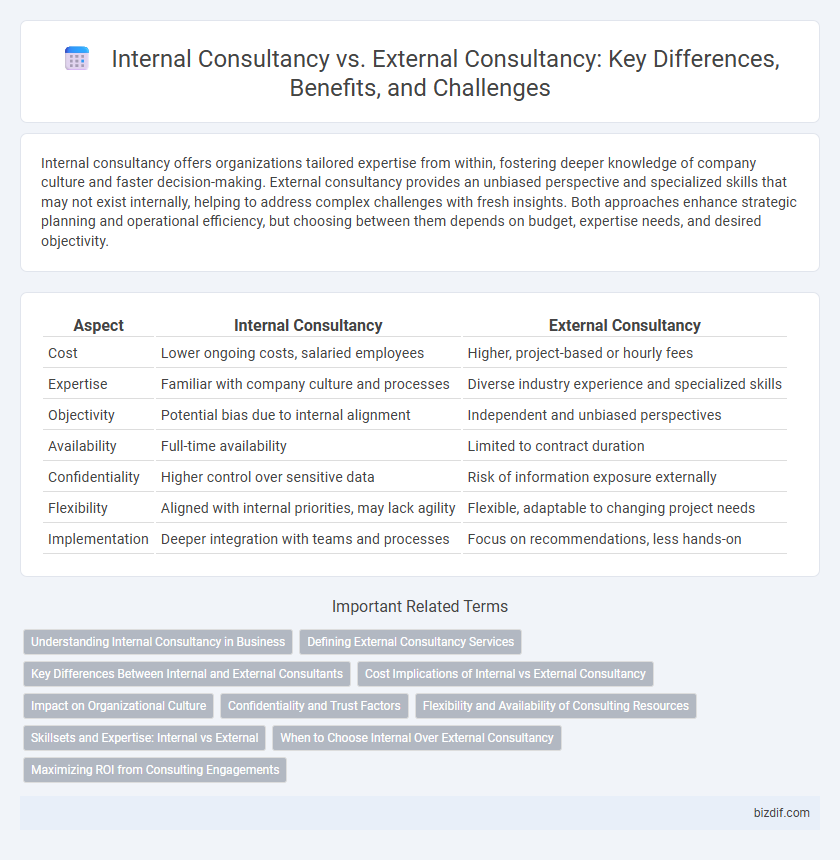Internal consultancy offers organizations tailored expertise from within, fostering deeper knowledge of company culture and faster decision-making. External consultancy provides an unbiased perspective and specialized skills that may not exist internally, helping to address complex challenges with fresh insights. Both approaches enhance strategic planning and operational efficiency, but choosing between them depends on budget, expertise needs, and desired objectivity.
Table of Comparison
| Aspect | Internal Consultancy | External Consultancy |
|---|---|---|
| Cost | Lower ongoing costs, salaried employees | Higher, project-based or hourly fees |
| Expertise | Familiar with company culture and processes | Diverse industry experience and specialized skills |
| Objectivity | Potential bias due to internal alignment | Independent and unbiased perspectives |
| Availability | Full-time availability | Limited to contract duration |
| Confidentiality | Higher control over sensitive data | Risk of information exposure externally |
| Flexibility | Aligned with internal priorities, may lack agility | Flexible, adaptable to changing project needs |
| Implementation | Deeper integration with teams and processes | Focus on recommendations, less hands-on |
Understanding Internal Consultancy in Business
Internal consultancy in business involves leveraging in-house experts to address organizational challenges, ensuring deep institutional knowledge and aligned company culture. This approach fosters cost efficiency and rapid response times compared to external consultancy firms, which bring specialized skills but may lack contextual familiarity. Companies utilizing internal consultancy benefit from continuous collaboration and tailored solutions that integrate seamlessly with existing processes and strategic goals.
Defining External Consultancy Services
External consultancy services involve hiring specialized experts from outside an organization to provide objective insights, strategic advice, and tailored solutions for specific business challenges. These services typically include market analysis, operational improvements, and change management, leveraging external consultants' diverse industry experience and best practices. By engaging external consultants, companies gain access to unbiased perspectives and advanced competencies not available internally.
Key Differences Between Internal and External Consultants
Internal consultants possess in-depth organizational knowledge and long-term alignment with company culture, enabling tailored solutions and seamless integration. External consultants offer specialized expertise, objective perspectives, and flexible engagement, often bringing industry best practices and diverse experiences. Cost structure, influence scope, and relationship dynamics significantly differ, impacting decision-making and project outcomes.
Cost Implications of Internal vs External Consultancy
Internal consultancy typically incurs fixed costs related to salaries, training, and benefits, providing long-term cost-efficiency for ongoing strategic initiatives. External consultancy often involves variable project-based fees that can be higher but offer specialized expertise and flexibility for short-term needs. Organizations must weigh the upfront investment of internal teams against the premium but targeted spending on external consultants to optimize budget allocation.
Impact on Organizational Culture
Internal consultancy fosters a deeper understanding of organizational values and promotes cultural alignment by leveraging existing relationships and knowledge. External consultancy introduces fresh perspectives and industry best practices, potentially triggering cultural change and innovation. Both approaches significantly impact organizational culture, with internal consultants enhancing cohesion and external consultants driving transformation.
Confidentiality and Trust Factors
Internal consultancy offers enhanced confidentiality as consultants operate within the organization, ensuring sensitive information remains secure and fostering deeper trust among stakeholders. External consultancy, while providing specialized expertise, requires robust confidentiality agreements and transparent communication to build trust and protect proprietary data. Establishing clear protocols for data handling and confidentiality is critical in both internal and external consultancy arrangements to maintain organizational integrity and client confidence.
Flexibility and Availability of Consulting Resources
Internal consultancy offers greater flexibility with readily available consulting resources embedded within the organization, enabling quick response to dynamic business needs and continuous support. External consultancy provides access to specialized expertise and scalable resources for targeted projects but may face constraints in availability due to multiple client engagements and contractual terms. Organizations balance internal consultancies' agility with external consultants' specialized skills to optimize resource allocation and project outcomes.
Skillsets and Expertise: Internal vs External
Internal consultancy leverages deep organizational knowledge and culture, enabling tailored solutions aligned with company goals, while external consultancy brings diverse industry expertise and specialized skills often unavailable internally. Internal consultants excel in long-term strategic alignment and continuous improvement, whereas external consultants introduce innovative approaches and best practices gained from multiple clients. Balancing internal insight with external perspectives ensures comprehensive problem-solving and enhanced business performance.
When to Choose Internal Over External Consultancy
Internal consultancy is ideal when organizational knowledge and ongoing collaboration are critical for project success, allowing for tailored solutions that align with company culture and long-term goals. It is preferable when confidentiality is paramount and quick, flexible access to consultants embedded within the company accelerates decision-making. Cost efficiency and sustained internal capacity building also make internal consultancy the better choice for continuous improvement initiatives.
Maximizing ROI from Consulting Engagements
Internal consultancy leverages in-house expertise to align projects closely with organizational goals, reducing costs and accelerating decision-making, which enhances ROI. External consultancy offers specialized skills and unbiased perspectives that can address complex challenges and drive innovation, often providing higher value through impactful solutions. Maximizing ROI involves strategically balancing internal knowledge with external insights to optimize resource allocation and deliver measurable business outcomes.
Internal consultancy vs External consultancy Infographic

 bizdif.com
bizdif.com